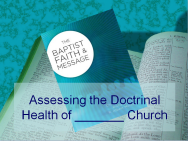The Southern Baptist Convention (SBC) will meet in Orlando, FL in June 2010 to receive a report and act on recommendations of the Great Commission Resurgence Task Force (GCRTF) appointed at the 2009 annual meeting of the SBC. I have read the report and recommendations that will be presented and largely support them. Some of the recommendations are broad and vague and that may be intentional to allow for flexibility. The vagueness may also cause some to distrust unstated intentions of the SBC leadership. In a perfect world there would be no unstated agendas but we do not live in a perfect world. Again, as a life-long Southern Baptist and pastor for almost 20 years, I support efforts to increase Cooperative Program giving, which is exclusively the Southern Baptist Convention method of supporting missions. I am willing to trust the leadership on many of the other provisions of the recommendations. However, one recommendation smacks of pride, arrogance, and provincialism (narrow-mindedness).
The GCRTF is recommending that only contributions in SBC churches that are for SBC missions, projects, and entities would be categorized as Great Commission Giving. Dr. Robert White, Executive Director of the Georgia Baptist Convention agreed with and praised the concept in the Georgia Baptist Index where he restated another’s assessment: “Great Commission giving is probably the best term for our missions giving that could be conceived.” (The Christian Index, May 20, 2010, 5) My comment, “What are they thinking?”
We live in a time when young pastors and Christians are disillusioned by bureaucratic denominational agencies and structures that were accepted in the past. Many young pastors see the agencies as places where professional religionists work, but who also have lost touch with what it is like to pastor in the local church. Some see the denominational agencies as trying to maintain bygone structures that are not contextual to churches in the 21st century. The younger generation of Christians and their leaders are more open to cooperative efforts with other churches and Christian organizations as long as they share the same essential doctrinal beliefs. For instance, many SBC churches eagerly support Franklin Graham’s ministry Operation Christmas Child. Under the new recommendations, contributions to OCC or Samaritan’s Purse would not be recognized as Great Commission Giving.
The ultimate result of the approved recommendation may do more harm than good. The action suggests an arrogance that says that only Southern Baptists do Great Commission work for the Lord Jesus Christ. I know that is not the intent of the GCRTF, but the action will not be accepted as a positive development by a less than trusting younger generation of Christians. Check your statistics and see how many people say they “don’t like organized religion.” It’s not that they don’t love Jesus Christ, and to be honest, they have not given up on “organized religion.” Rather, they have rejected institutional denominational religionists as much as Jesus rejected the Jewish Pharisees.
The GCRTF should recommend some other terminology, because the term “Great Commission Giving” may drive the younger generation of Christian leaders further away. To that end, I would suggest that denominational and church leaders move away from policies and resolutions that at the heart, seek to mandate or control. Instead, find methods and opportunities to create “chosen accountability” that encourages people to own the vision. The Cooperative Program funding method for missions is exclusively Southern Baptist, but Great Commission giving is for all Christians.
I’m just sayin’
Dr. Tom Cocklereece








Leave a comment